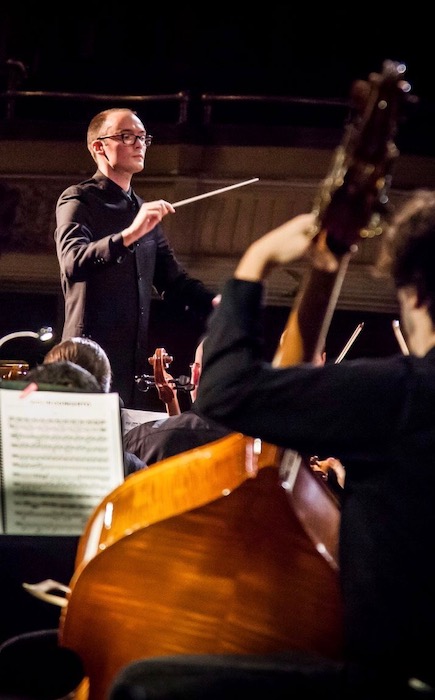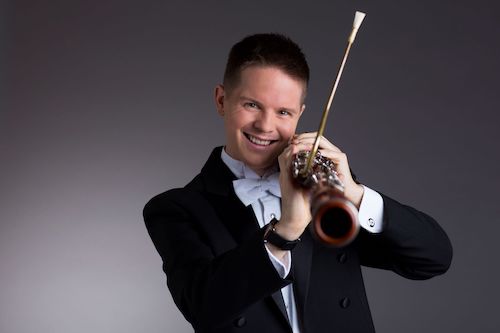Lakeview Orchestra tests its heavy mettle with “Rite of Spring”

You have to give Gregory Hughes and the Lakeview Orchestra musicians credit. How many volunteer ensembles would even attempt a performance of Igor Stravinsky’s Rite of Spring—a work so infamously difficult that Pierre Monteux requested over a hundred rehearsals for its first performance by the Ballets Russes?
No audience member got hit on the head with an umbrella Tuesday night at the orchestra’s performance at the Athenaeum Theatre, unlike the ballet’s infamous 1913 premiere in Paris, which provoked aisle scuffles and a riot.
Still, whoever was in charge of the venue’s engineering system deserved at least a couple good shots. Just before Hughes gave the downbeat to Tuesday’s Rite, offstage metallic noises commenced, like someone loudly folding metal chairs. The mechanical sounds continued off and mostly on throughout the rest of the performance. (On Wednesday, the orchestra said that the Athenaeum’s radiators were to blame for the noisy distraction, an issue that had never happened before at the theater in their experience.)
As if playing the Rite isn’t enough of a challenge in itself, that intermittent clanking obbligato made things even more difficult for the players, who had to filter out the noise while concentrating on Stravinsky’s fast-changing rhythms and time signatures.
But Lakeview’s music director and his (mostly) amateur musicians handled the situation with the utmost professionalism, delivering a solid and often galvanic account of Stravinsky’s epoch-breaking ballet under Hughes’ alert direction.
It would be idle to pretend that the Lakeview performance was in the same league as one might expect from a leading professional ensemble, let alone the Chicago Symphony Orchestra or any top-tier orchestra.
But despite the lack of tonal gleam and fitful tuning and timing mishaps, Hughes and his hardy band served up a game and largely effective reading. There was ample energy and vitality in the primal driving rhythms, if not the unhinged ferocity the score ideally requires. Quieter passages proved less consistent; the Introduction to Part II needed greater mystery and more hushed playing than it received.
While instrumental solos proved variable, there were some standouts—the atmospheric opening solo bassoon, and the E-flat clarinet and alto flute among them. Strings were mostly assured and brass largely admirable. The timpanists seem to get tangled up in the shifting rhythms of the headlong final section.
Still the symphonic fury and audacious ingenuity of the music came across with strong impact. Certainly, the orchestra’s faithful and growing audience didn’t feel shortchanged, judging by the cheers and extended and enthusiastic applause.
The first half of the evening was devoted to music of Mozart (where there were no HVAC noises off, mercifully).
Miles Maner proved a somewhat mild-mannered soloist in Mozart’s Bassoon Concerto. As one would expect from a CSO member, his playing was technically impeccable, Maner rendering Mozart’s lines with an easy-going, gracious touch.
What was lacking was a more varied color palette and the kind of individual spark that might have lifted the performance above admirable routine. Maner’s approach was low-key almost to the point of blandness at times. While his slender tone and songful approach to the Andante were agreeable enough, the soloist didn’t explore much of the expressive potential of the music.
Hughes scaled down his accompaniment to suit his soloist’s lightly projected style, drawing mostly worthy orchestral support, marred by some persistently grim horn playing in tuttis.
Mozart’s Overture to The Magic Flute, which opened the evening, sounded like it got the short end of rehearsal time. Hughes led a beefy account that was stronger on punchy drama than on balance and refinement, with the blaring brass swamping the rest of the orchestra more than once.
Gregory Hughes conducts the Lakeview Orchestra in Strauss’s Till Eulenspiegel’s Merry Pranks, Beethoven’s Piano Concerto No. 5 with soloist Andrew Staupe, and the winning TBA work from the orchestra’s 2019 Composition Competition. Concert time is 7:30 p.m. April 30 at the Athenaeum Theatre. lakevieworchestra.org
Posted in Performances



